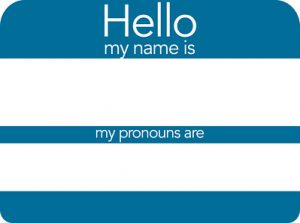“Who Art in Heaven,” they/them/their

When I was in seminary training to be a pastor, inclusive gender language in worship was all the rage. I was at a progressive Christian school and it was the turn of the millennium. My professors were involved in inclusive language revisions of major hymnals, psalm books, and prayer books across many Christian denominations. It was expected that students in our school would follow this trend, and I was an enthusiastic supporter.
At that time, what we meant by inclusive gender language in worship was the erasure of androcentric and patriarchal language. We meant things like, “Replace mankind with humankind” and “We’re not ‘sons of God,’ we’re ‘people of God.’” We also meant, “Stop referring to God with ‘he’ ‘him’ or ‘his.’” And we meant, “Sometimes, call God ‘she’ or ‘mother.’”
I was relatively young to be studying for the ministry, in my early twenties, and I was keen to learn the new, gender-sensitive practice and reshape myself spiritually. So I undertook with determination the project of getting masculine images for God out of my head. I went beyond avoiding masculine language for God in public, for instance in worship leadership or class discussion. I challenged myself to stop thinking God as male. I made myself notice whenever the images of holiness that “naturally” came to me in my prayer life or academic life were male images. I committed to shifting the images to non-masculine concepts of God.
It took me two years. I made note of that time duration and have since used it to reassure students on a similar path. “Be patient with yourself; it took me two years.” I also noticed that my journey wasn’t away from male language into feminized language for God. Rather, I journeyed out of most gendered language for divinity altogether. I gave up on pronouns for God and got creative about doing without them in public worship and teaching.
I haven’t missed the pronouns for God. But recently, twenty years later, I’ve been embracing a return to them for reasons I didn’t anticipate.
In the American university context in which I teach, it’s becoming a professional norm to use pronouns when introducing oneself, in order to support transgender, nonbinary, and gender non-conforming people and the new uses of pronouns that are emerging from their work. I serve as a chaplain for Protestant worship services on a Catholic campus where we distribute nametags to everyone and ask that all put their pronouns on them. I like the practice. Wearing them in worship has made me start to wonder what such a nametag would look like on the divine.
Last semester the They/Them Project came to visit our campus, and as the panelists spoke to a packed room, one of the speakers spoke of holiness in a way that was illuminating for me. Someone in the audience asked an (all too common!) question about growing up GLBTQ and feeling condemned by Christianity. I’ve forgotten much of the very helpful response from the speaker, so transfixed was I by the pronouns for God used in the speaker’s response: “If God is a loving God, then they…”
I was caught up in delight at the way God, whose oneness is critical to my monotheistic tradition, could be at the same time assuredly they/them/their in a context that seeks to embrace a variety of gender identifications. And while I’m now twenty years into an apophasis—an intentional unknowing or lack of speech—about pronouns for God, I find myself newly willing to claim pronouns that are themselves apophatic and to explore what “they,” used for individual persons, opens up in our thinking about a monotheistic God.
On the edge of this new decade, I welcome the project of inviting they/them/their pronouns for God into my head. I challenge myself to think about God with these terms. I want to notice what new images and capacities for holiness this opens up privately and publicly.
I imagine it will take about two years.
Even for those not as embedded in religious cultures as I am, attention to they/them/their pronouns for individual persons in our human context opens up new paths for thinking and makes a good new year’s practice. How much weight do we hang on our pronouns? How much do we assume we know about a person when we assume their pronouns? We miss important things about each other when we make easy assumptions, and we hurt each other too.
In the churches too this assuming causes a large and often unnoticed loss. Inviting they/them/their pronouns into our lexicon for individuals isn’t only about inclusion and welcome in faith communities—though there is nothing minor about that in itself. It’s also about releasing our theological imaginations from the cultural strictures which have limited them. It’s about allowing another to introduce themselves to us anew, even when that other is God.
#
Rev. Dr. Anna Mercedes is Associate Professor of Theology and Gender Studies at the College of Saint Benedict and Saint John’s University and is ordained in the Evangelical Lutheran Church in America. She is the author of Power For: Feminism and Christ’s Self-Giving.
Counterpoint blogs may be reprinted with the following acknowledgement: “This article was published by Counterpoint Navigating Knowledge on 15 January 2020.”
The views and opinions expressed on this website, in its publications, and in comments made in response to the site and publications are those of the author(s) and do not necessarily reflect the views and opinions of Counterpoint: Navigating Knowledge, its founders, its staff, or any agent or institution affiliated with it, nor those of the institution(s) with which the author is affiliated. Counterpoint exists to promote vigorous debate within and across knowledge systems and therefore publishes a wide variety of views and opinions in the interests of open conversation and dialogue.



